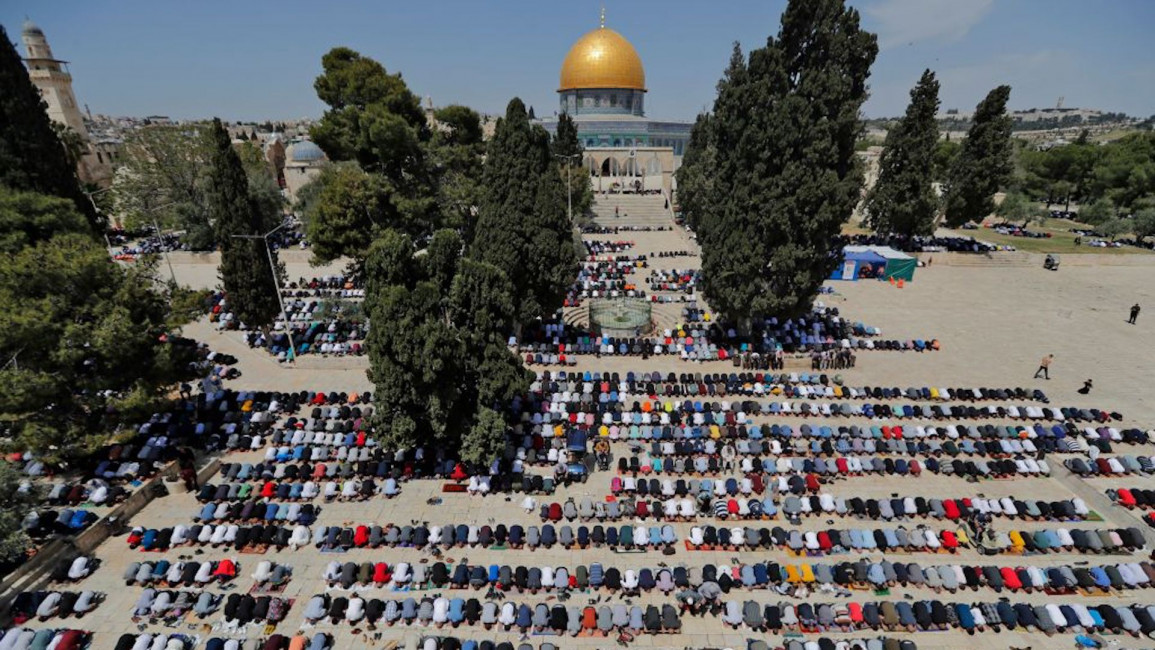How are Saudi and Emirati media covering Israeli violence against Palestinians?
The violent crackdown by Israeli police on Palestinian worshippers at the Al-Aqsa Mosque in Jerusalem, which left hundreds of people injured, and the Israeli military's bombardment of Gaza has led to contrasting media coverage throughout the world.
Many Western news agencies, for example, have framed the violence in Jerusalem as "clashes" but Palestinians have taken issue with this, noting that many more Palestinians than Israelis have been injured and killed and that heavily armed police and security forces have used disproportionate violence against unarmed protesters, journalists, and medics.
In the Arab world, there has been a contrast in the way Emirati and Saudi media have covered the recent events in Israel and the occupied Palestinian territories, with Saudi media much more likely to criticise Israel and UAE media more likely to cover events using a similar tone and language to Western news agencies.
Media in both countries is heavily controlled and restricted by the government.
What has Saudi media said?
By and large, Saudi media has taken a critical stance against Israel's actions in East Jerusalem. The pro-government newspaper Al Riyadh carried headlines describing Israel's activities at the Al-Aqsa mosque of "aggression".
For example, one story has the headline "The Muslim World League vigorously censures and condemns the gross violation of the sanctity of Al-Aqsa mosque and worshippers".
Another story highlighted the Saudi foreign minister's denunciation of the threatened expulsion facing dozens of Palestinian families in the Sheikh Jarrah neighbourhood of east Jerusalem.
Twitter Post
|
Saudi Arabia's Al-Okaz newspaper has framed an attack on residential building which killed two leader of Gaza-based Islamist movement Palestinian Islamic Jihad (PIJ) as a "violent bombing".
The pro-Palestinian trend was repeated in the Al-Watan daily, which published a statement by Amnesty International deploring Israel's use of force in Jerusalem and headlined a story on Israeli bombardment of Gaza with "The Israeli occupation broadens its military assault and violates human rights".
What has Emirati media said?
The UAE, which has normalised ties with Israel, has covered the events much less critically. Its outlets have relied heavily on the style and content of Western wire services.
An editorial in Al-Ittihad was entitled "No to violence and hate". It featured lukewarm calls for an end to "tensions" in East Jerusalem and took issue with"practices which violate the sanctity of Al-Aqsa mosques".
The piece was in line with the UAE's current stance on Israel, following the normalisation agreement signed between the two countries last year.
It said that Israel was responsible for "protecting" Palestinians living under Israeli control, under international law.
Al-Ittihad also reported a statement by Anwar Gargash, a senior UAE official, in which he affirmed Emirati support for Palestinian rights.
However, Arabic-language broadsheet Al Khaleej framed Israeli strikes on Gaza, which have killed dozens of people including at least ten children, were a "response" to rocket fire by Palestinian factions from the besieged coastal strip.
In a piece headlined "30 Palestinian victims of bombing as Gaza's rockets rain down on Israel", the situation was presented as being sparked by generic "clashes" in East Jerusalem.
The Emirati newspaper Al-Bayan reported on the "concern" of Crown Prince Mohammed bin Zayed, widely considered to be the UAE's de facto ruler, for "the violence" in Jerusalem.
A piece by the managing editor affirms the UAE's support for Palestinians and its commitment to stopping bloodshed, while distancing itself from armed Palestinian factions.
Follow us on Facebook, Twitter and Instagram to stay connected



